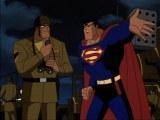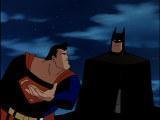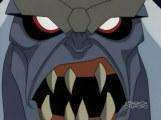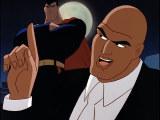
 |
| Interview Conducted by Stu December 2nd, 2005 What originally brought you to Superman? How did you come to work on the show? I was working on Spider-Man in 1995, and John Semper told me that he'd read in the trades that Superman was starting up over at Warners. Since Spider-Man was winding down at that point, he suggested I give them a call. Oddly enough, my doctor, who's always been interested in show business, also gave me the same advice. So how could I not do it? I had my agent call Alan, and Alan was apparently impressed that I'd worked on the live action Superboy, so he soon had me working on the "Way of All Flesh" script. Most stories about how people get jobs are a lot more complicated than this one was.  What was originally supposed to happen in the conclusion to
The Prometheon? What was originally supposed to happen in the conclusion to
The Prometheon?The original ending had aliens running across the creature in space some time later. And of course, they can't help themselves from poking this sleeping dog, and, we're led to assume, the whole thing starts all over again. This ending was in the original storyboards, but the episode simply ran too long, so it was cut. Superman featured a wide array of guest stars from the DC universe. Are there any characters you’d like to have Superman team up with but never got the chance? I liked the Spectre, but someone else had the rights. What were you hoping to accomplish when teaming Batman up with Superman? Also, what was your first experience writing for The Dark Knight like? Batman's dark outlook tends to be a good counterpoint to Superman's rosier view, so the combination can lead to some interesting philosophical exchanges. My first experience writing for Batman was the story in which Scarecrow found a way to eliminate people's normal fear. It was a nice change to write for a character that was human, and therefore more vulnerable than the super-human Superman. Much easier to write for, too.  You previously wrote for the live-action
Superboy series. Did you find
the change to Superman difficult after writing for a younger version for
so long? You previously wrote for the live-action
Superboy series. Did you find
the change to Superman difficult after writing for a younger version for
so long?Back on Superboy, we tried to view our hero as pretty much full grown. It helped that the actor who played him, Gerard Christopher, was well into adulthood (though quite youthful looking) when he signed on for the part. Even so, Superboy was a little less sure of himself and a bit less dominating than the somewhat older, more experienced hero of the Superman animated show. So I had to take that subtle difference into account, which was not difficult. "The Late Mr. Kent" is one of the most-loved episodes of STAS. What inspired the story? Paul Levitz of DC took the writers to lunch and talked about the different kinds of Superman stories that had worked well in the comics. He mentioned that one kind of story they liked were the ones in which a problem for Clark affects Superman. So, I thought later, what bigger problem could Clark have than to be "killed"? (A bit of trivia about the episode: the man who witnesses Clark's death turns out to have bad vision, but in the original draft, I took into account that he was an old man, living out in the middle of nowhere, and wide awake at three in the morning. Why? He was waiting for the fairies to come, as he believed they did every night. Yep, the old guy was crazy, not nearsighted, and Clark discovers this at the very end... much to his relief. But I guess Alan didn't want it to look like Clark was somehow exploiting someone with mental illness. So he suggested the new ending, which everybody seems to be pretty happy with). "Brave New Metropolis" was the first alternate-universe story in the current DC Animated Universe. How did the idea to do it come about? Alan wanted to do an alternate world romance, and I eagerly volunteered. I've loved alternate world stories ever since "It's a Wonderful Life," and when I read an account in Spy Magazine in the late eighties that considered the scientific possibility of alternate worlds, I decided to do one for Superboy. In that two-parter, Superboy goes to not one, but two alternate worlds, and in one, he sees what the world would be like if he broke his rule about killing people, and in the other, he sees a world where an egotistical Superboy had become dictator. Not a pretty picture. Later, we did two more, one of which featured a very young Superboy, and the other, an older, retired Superman. Many years later, we took on the Justice Lords. I think people like these stories because they're always wondering how their lives would have turned out if they made different decisions. Either that or they just like to see their heroes in cool new costumes.  In Justice League, Superman fought Doomsday, one of his most famous
adversaries. Were there ever any plans to introduce Doomsday in
Superman’s own show? Also, what made you use him in Justice League? In Justice League, Superman fought Doomsday, one of his most famous
adversaries. Were there ever any plans to introduce Doomsday in
Superman’s own show? Also, what made you use him in Justice League?As far as I know, there was no plan to use Doomsday in Superman; after all, he was kind of an uninteresting villain, wasn't he? As far as using him in "Better World," it was a good way to show just how much of a badass the Justice Lord Superman was; the fans knew that in the comics, Doomsday was so tough, he killed the real Superman; but this new Superman is so much tougher, he dispatches the monster with nothing more than a blast of heat vision. Where there any restrictions when writing the Legions Of Superheroes episode? Also, what inspired the story to take place before Clark became Superman? I don't know the answer to this one because I didn't come in until the re-write stage. But in general, it was hard to get guest stars from other comics because the film and TV rights had often been sold to other companies. What’s your take on how powerful Superman should be? Did you think the series made him too weak, too strong, or just right? If you watch all the episodes, you'll see that the level of his strength and invulnerability varies considerably from episode to episode, writer to writer, and director to director. That's because when you're dealing in the super-human world, there are no relevant real world standards to go to. Can he lift a car without straining? A building? A planet? We never sat down and made a list, because it would have been too confining. As a writer, I prefer to deal with characters who aren't so strong that they can solve all their problems with their strength alone, or so invulnerable that nothing can harm them.  Which of the various Superman villains were your favorite, to both write
and watch? Which of the various Superman villains were your favorite, to both write
and watch?Luthor and Luthor. I loved hearing Clancy Brown's interpretation of the lines, but I must admit that it isn't easy to write for a character who is so endlessly clever. When it works, though, it's quite rewarding. Are there any stories you’d have like to tell, but never got the chance to? Only one, an anti-war story. Clark is sent to cover a fight between two small countries over oil, and, when he sees the carnage, he decides to intervene. Obviously, we couldn't show people dying, so I wanted to substitute an art museum and all its treasures being burned to the ground. That's what would have made Clark decide to use his extraordinary powers to stop the war. Once Superman leaves, of course, the two sides immediately go back to killing each other. The only other thing I wanted to do was produce a series of Elseworlds direct to video DVDs; they'd focus on different characters and different times. There would have been long stories and very short ones, written by different people and animated by different artists, so each segment would have a unique look. Warners wasn't interested, though. What was your overall opinion of the show? Good work. I wish we could have done more. I felt like we were just warming up when we were all switched over to Batman. What projects are you currently working on? When can we expect to see them? I left Warners in the summer of 2004 when a company in England offered me a deal that was just a little better than the one I had. The two key elements for me were that I'd be able to visit England and Canada, and that my work would be covered under a Writers' Guild of America contract, which has much better pension and credit arbitration benefits than the contract I had been working under. I was worried about leaving all my friends behind, but it turned out that I was able to hire many of them to write scripts for the new project: Alan Burnett, Dwayne McDuffie, Robert Goodman, Len Uhley (Static Shock), Paul Diamond (The Zeta Project) and Joelle Sellner (Teen Titans). The name of the show is Friends and Heroes, there's no release date for it yet, and it's designed for an audience that's much younger than the folks who'll be reading this. No super-heroes, either. After the scripts for Friends and Heroes have been completed, which will be soon, I have no plans, except to relax and catch up on my sleep and my TV viewing. The World’s Finest would like to thank Stan Berkowitz for his
participation in this Q & A. |